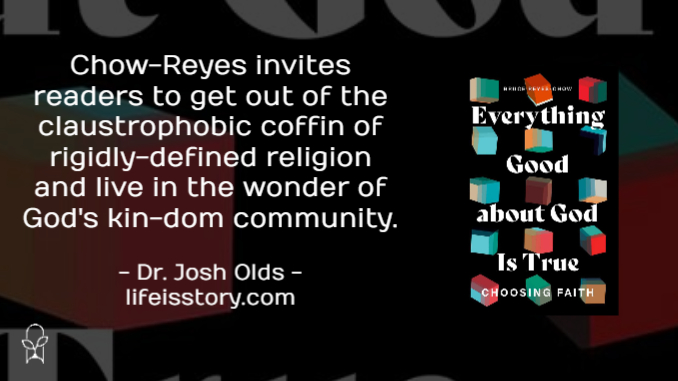
Published by Broadleaf Books on March 5, 2024
Genres: Non-Fiction, Christian Life, Theology
Buy on Amazon
Goodreads

A better story of faith exists, and it has the capacity to heal the world--if we only embrace, articulate, and live it more courageously. You know what you don't about the Bible, the church, and God. You don't agree with the doctrines of an exclusionary, dominant Christianity. But what if someone asked "What do you believe?" In this primer on progressive, expansive, generous Christianity, writer and pastor Bruce Reyes-Chow helps us reconsider--or consider for the first time--what it means to choose faith. What if we could articulate the gospel of love, kindness, humility, and justice? What if the Christian narrative both embraces contradiction and lays claim to deep, historic truths? And what if everything good about God is actually true? With clarity, vulnerability, and wit, Reyes-Chow helps us learn a grammar of faith about God, Jesus, and the Spirit that breathes fresh meaning into old words like sin , confession , salvation , baptism , communion , and gratitude . He doesn't shy away from calling out the hateful and hurtful dogmas of many churches, but he also turns our attention toward essential What if God created humans to be beautifully complex? What if the Spirit calls us to lament and repent and also beckons us toward pathways of healing, wholeness, and hope? And if Jesus equips us for lives of justice and kindness, how might our imaginations expand for what the world could be? Reyes-Chow offers his own "faith montage" and helps individuals and groups create their own. There is a more loving, more genuine vision of God than the one we see being performed around us, and this book helps us find it.
In the introduction to Everything Good About God is True, Bruce Chow-Reyes writes that “We can no longer abdicate the Chrisian story to hate, violence, and oppression. Those of us who occupy this more loving, just, and extended version of the Christian story must do a better job of claiming, articulating, and speaking the hell up.” That’s a good summary of what this book is about. The Christianity “in the national conversation,” as Chow-Reyes puts it, is clear about what it is against. Unfortunately, the progressive Christian counterargument is often to also claim what we’re against. Everything Good About God is True is founded on the perspective that the Gospel is made more accessible and palatable when we share with the intention of actually sharing it as Good News.
Chow-Reyes divides his book into four parts: Creator and Us, Spirit and Us, Jesus and Us, and the Good News and us. It’s a theology that’s neither systemic or comprehensive, but rather intended to focus on the distinctives of a progressive faith. Poetry is interspersed throughout the book, lending it a liturgical and artistic flair that melds with the rest of the book’s conversational and informal style.
Even though Everything Good About God is True has a bit of an unconventional structure and isn’t meant to directly contrast conservative Christianity, Chow-Reyes does offer progressive interpretations of Christian doctrine that enable deconstruction without demolition. And that, I think, is at the heart of what this book is trying to do. So many people—whether born in the faith or not—are looking at the culturally dominant form of Christianity and recognizing its toxicity and rightfully moving away from it. But in the absence of any alternative, deconstruction becomes demolition. They move away from faith entirely. Chow-Reyes offers the tools of deconstruction and reconstruction, showing readers that a Christianity outside of nationalistic strains exists.
For example, in a chapter entitled “Hurting,” Chow-Reyes talks about the concept of sin. Conservative Christians often claim that progressive Christianity has no understanding of sin. Everything Good About God is True recognizes the existence of sin, names it “any act or thought that turns us away from God’s intentions,” and laments how sin manifests itself.
As Bruce closes the book, he tries to summarize everything that he’s said in the previous 170 pages:
You are known by God.
You are loved by God.
That is enough.
You are enough.
That’s a beautiful message, one that contrasts the “not-enoughness” of conservative Christianity. One that offers hope, healing, and comfort. Chow-Reyes invites readers to get out of the claustrophobic coffin of rigidly-defined religion and live in the expansive wonder of God’s kin-dom community.
